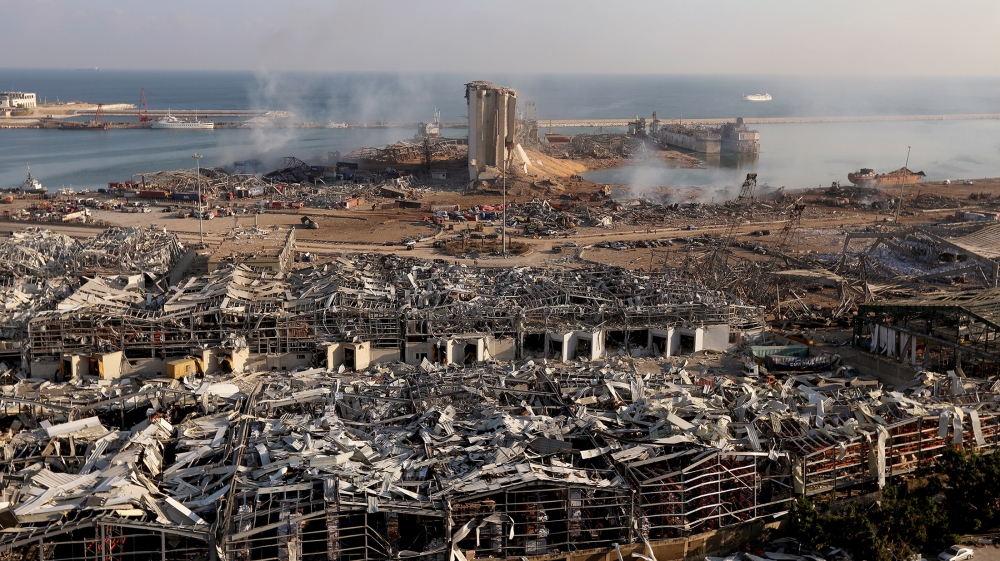Post by Admin on Aug 5, 2020 1:03:47 GMT
Two huge explosions have rocked Beirut, killing at least 78 people, injuring thousands more, and sending an enormous blast wave across the city that shattered windows, knocked down doors and shook buildings.

Lebanon’s prime minister, Hassan Diab, said the main blast at Beirut’s port was caused when an estimated 2,750 tons of ammonium nitrate had been ignited. He said the chemical had been left unsecured for six years in a warehouse, and vowed to punish those responsible.
As the death toll climbed on the discovery of more bodies in the wreckage, at least 4,000 were reported injured. Hundreds of homes were left uninhabitable by the blast which also destroyed huge grain silos, a devastating blow to a country where bread was already scarce and which is dependent on imports by sea.
The US Embassy in Beirut released a statement advising that people wear masks and stay indoors, following “reports of toxic gases released in the explosion”.
The American University of Aerosol Research Lab’s indicators showed that air quality levels had returned to “Good” by 7pm on Tuesday, however, after showing “Moderate” levels of particulate matter an hour earlier.
Thousands of people sought treatment in nearby hospitals, which were struggling to cope with the casualties. Cars were left strewn across the surrounding highway, and the blast was heard up to 80km (50 miles) away in the country’s north. The health minister, Hamad Hassan, put the confirmed death toll at 78, with at least 4,000 injured.
On Tuesday night Lebanon’s Supreme Defence Council recommended declaring Beirut a disaster-stricken city, declaring a two-week state of emergency in the capital and handing over security responsibility to military authorities.
Donald Trump fuelled the confusion swirling in the hours following the explosion, by referring to it in on-the-cuff remarks as “an attack” which took place at 6.05pm (16.05 BST), adding that “some of our great generals” had told him “it was a bomb of some kind”.
Israel has denied any responsibility and offered humanitarian and medical aid.
Initial reports suggested that a fireworks warehouse was involved. The Lebanese security chief, Abbas Ibrahim, later blamed combustible chemicals stored in a warehouse. The interior minister, Mohammed Fahmi, said ammonium nitrate had been among the materials stored and called for an investigation into how it ignited.
“Talk of fireworks is ridiculous,” said Ibrahim. “There are no fireworks but rather highly explosive material, and I can’t foretell the investigations … it seems the explosion happened in a warehouse of highly explosive material that was confiscated years ago.”

Lebanon’s prime minister, Hassan Diab, said the main blast at Beirut’s port was caused when an estimated 2,750 tons of ammonium nitrate had been ignited. He said the chemical had been left unsecured for six years in a warehouse, and vowed to punish those responsible.
As the death toll climbed on the discovery of more bodies in the wreckage, at least 4,000 were reported injured. Hundreds of homes were left uninhabitable by the blast which also destroyed huge grain silos, a devastating blow to a country where bread was already scarce and which is dependent on imports by sea.
The US Embassy in Beirut released a statement advising that people wear masks and stay indoors, following “reports of toxic gases released in the explosion”.
The American University of Aerosol Research Lab’s indicators showed that air quality levels had returned to “Good” by 7pm on Tuesday, however, after showing “Moderate” levels of particulate matter an hour earlier.
Thousands of people sought treatment in nearby hospitals, which were struggling to cope with the casualties. Cars were left strewn across the surrounding highway, and the blast was heard up to 80km (50 miles) away in the country’s north. The health minister, Hamad Hassan, put the confirmed death toll at 78, with at least 4,000 injured.
On Tuesday night Lebanon’s Supreme Defence Council recommended declaring Beirut a disaster-stricken city, declaring a two-week state of emergency in the capital and handing over security responsibility to military authorities.
Donald Trump fuelled the confusion swirling in the hours following the explosion, by referring to it in on-the-cuff remarks as “an attack” which took place at 6.05pm (16.05 BST), adding that “some of our great generals” had told him “it was a bomb of some kind”.
Israel has denied any responsibility and offered humanitarian and medical aid.
Initial reports suggested that a fireworks warehouse was involved. The Lebanese security chief, Abbas Ibrahim, later blamed combustible chemicals stored in a warehouse. The interior minister, Mohammed Fahmi, said ammonium nitrate had been among the materials stored and called for an investigation into how it ignited.
“Talk of fireworks is ridiculous,” said Ibrahim. “There are no fireworks but rather highly explosive material, and I can’t foretell the investigations … it seems the explosion happened in a warehouse of highly explosive material that was confiscated years ago.”


